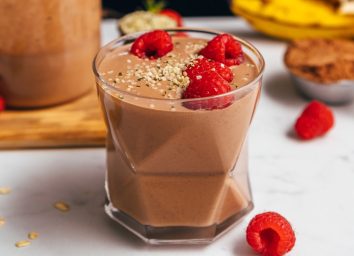8 Highest Quality Proteins To Eat Every Day, Say Dietitians
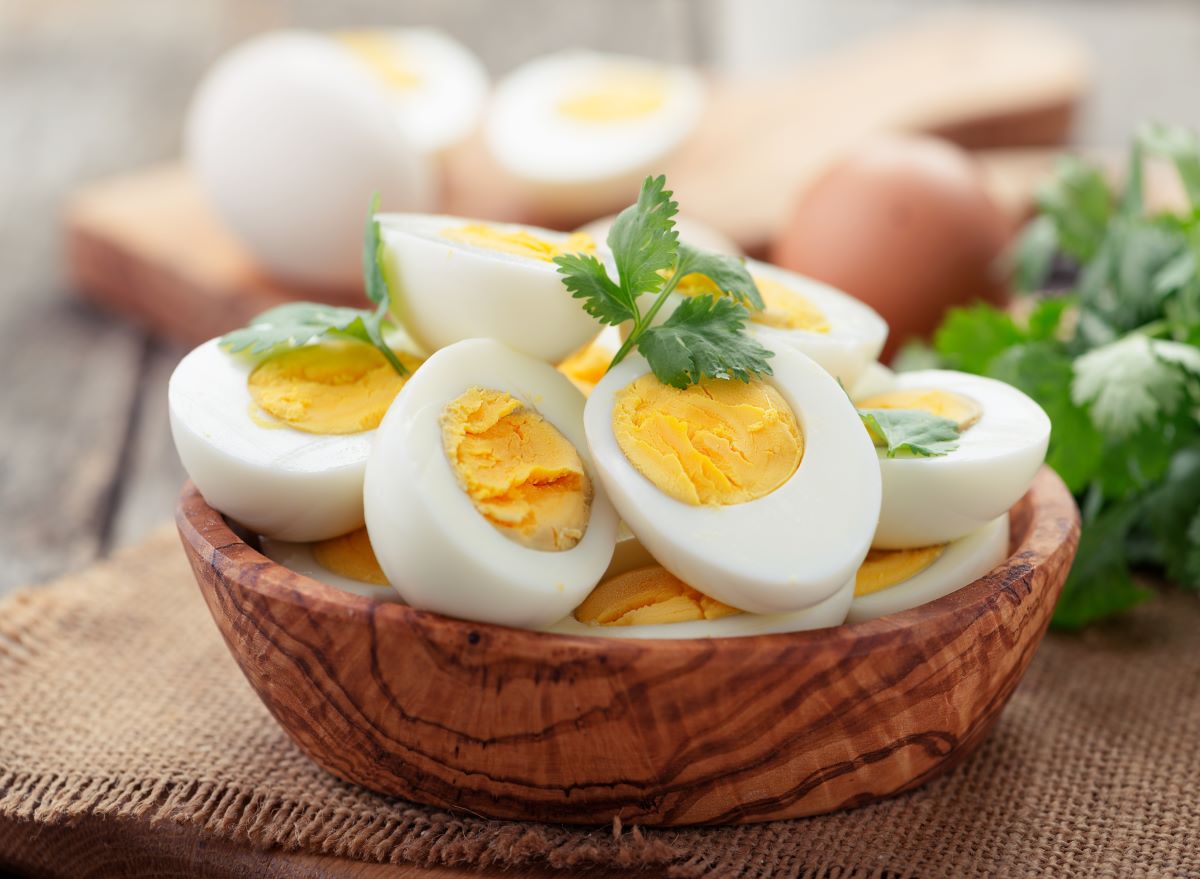
Protein is critical for repairing cells and tissues, as well as helping to stabilize blood sugar and quell hunger. But not all proteins are created equal. You need to be adding high-quality, lean protein to your plate to most effectively lose weight, get stronger, and improve overall health.
There are two main factors we are referring to when we say a protein is "high-quality." The first is that it provides a lot of nutrients without a ton of negative qualities. "For example, fatty cuts of meat like bacon contain protein, but they are also packed with artery-clogging saturated fat, sodium, and other unhealthy components that not only crowd out some of the protein that is found in leaner animal products, but that also negatively impact health," say Lyssie Lakatos, RD, CDN and Tammy Lakatos Shames, RD, CDN, who make up the Nutrition Twins and are also members of the Eat This, Not That! Medical Expert Board. "The highest-quality animal proteins provide beneficial nutrients without these negative factors."
The second factor that makes a protein high-quality is if it contains all nine amino acids. These amino acids are called "essential" because they are critical for building proteins, hormones, and neurotransmitters, and our bodies cannot produce them on their own; they must come from our food. Not all proteins contain every essential amino acid, but when they do, they are referred to as a "complete protein." All animal proteins are complete, but not all plant proteins are. For instance, even though vegetables are extremely healthy and nutrient-dense, they're not considered complete, which is why they aren't on our list.
Read on for the eight best sources of high-quality proteins—both animal- and plant-based. Also, for more info on how to eat healthy, don't miss The #1 Best Protein To Eat Every Day, Says Dietitian.
Greek yogurt
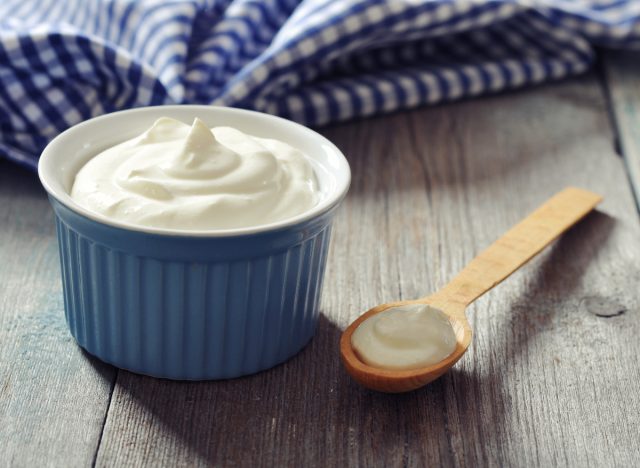
If you're looking for a high-quality protein that works great as a snack or breakfast item, try a bowl of Greek yogurt.
"Greek yogurt can contain around 14–18 grams of protein, depending on the brand, and it also provides nine essential nutrients, as well as probiotics, which are good bacteria that can help your gut achieve a healthy bacterial balance" says Amy Goodson, MS, RD, CSSD, LD author of The Sports Nutrition Playbook and member of our Expert Medical Board.
Dairy often gets a bad rap, but it can actually provide many health benefits. According to Goodson, "A [2021] study published in Nutrients looked at dairy consumption data and found that dairy foods are linked to reduced risk of heart disease deaths and were not linked to cancer or all-cause mortality. This aligns with the Dietary Guidelines for Americans' statements on dairy's benefits to healthy eating patterns."
Dairy milk
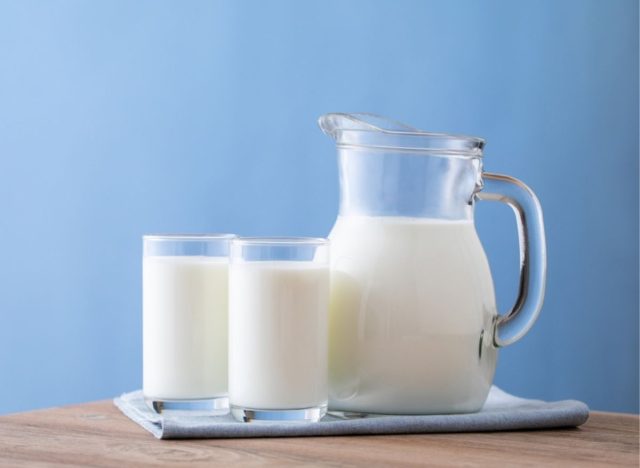
Whether you pour yourself a glass of it or throw it into some high-fiber cereal in the morning, cow's milk can be a delicious high-quality protein to add to your daily diet.
"Dairy milk provides 13 essential nutrients per 8 ounce serving, including high quality protein, and in fact, milk provides one gram of protein per ounce," says Goodson. "It is also worth noting that 12 of milk's 13 nutrients are naturally found in milk—only vitamin D is added. Vitamin A is naturally present in milk, and it is added back to low-fat [or] fat-free milk as part of the fat removal step."
"A systematic review published in the Journal of the American College of Nutrition in 2020 evaluated 27 randomized control trials and found that dairy products (milk, cheese, and yogurt) and dairy proteins (e.g., whey protein) have neutral to beneficial effects on inflammation," adds Goodson.
So, unless you're lactose intolerant or just don't like milk, don't hesitate to pour a glass and enjoy the benefits.
Quinoa
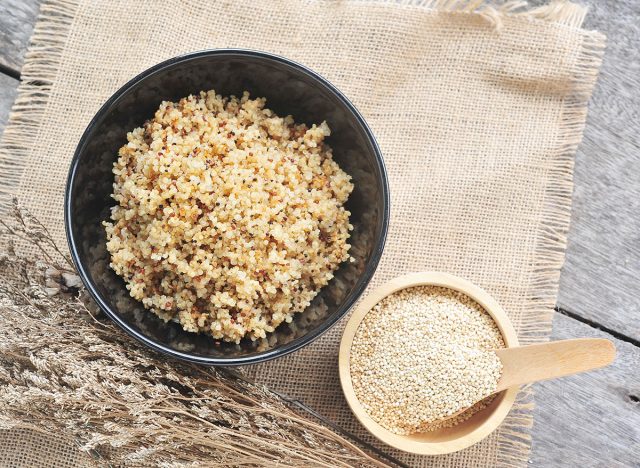
Quinoa is a healthy, versatile grain that can be used in many bowls, salads, and as a side to your favorite meals. This whole grain is considered to be a complete, high-quality protein because it contains all of the amino acids, but some experts have argued that it should be considered a "nearly complete" protein, as it has lower amounts of certain aminos. Still, it is a high quality protein with many other nutrients to offer, such as fiber, folate, and antioxidants, and quinoa has been found to help lower LDL cholesterol and manage weight.
Eggs

"Eggs are always referred to as the best protein," says Julie Upton, MS, RD, CSSD, a registered dietitian on our medical expert board. "They are the gold standard because they have the most bioavailable amino acids."
For instance, eggs score 100 in biological value, a measure of how efficiently the body utilizes protein consumed in the diet. Beef, for comparison, scores 80. Only whey protein scores higher with a biological value of 104.
"Eggs are also an excellent source of choline, which is important for brain development, as well as memory, thinking, and mood," says Goodson.
Skinless poultry breast
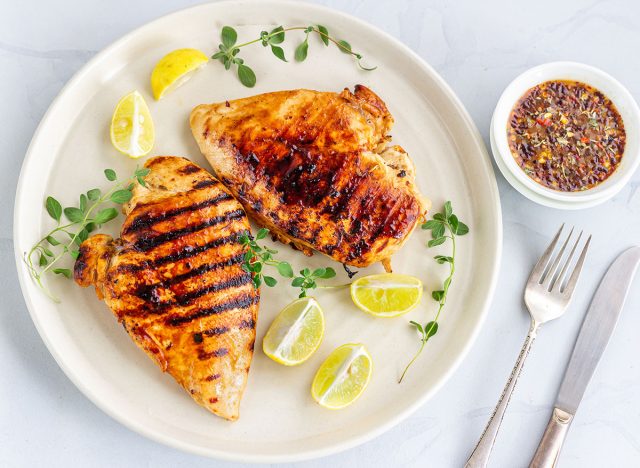
Minus the skin, chicken and turkey breast "are ideal for building and repairing tissues and maintaining lean muscle, as they're naturally low in saturated fat and sodium," says Tammy Lakatos Shames. "[Lean poultry breast] is a good source of B vitamins, which are essential for DNA synthesis, energy production and for brain health and it contains the antioxidant selenium, which is important for immune and thyroid health."
Goodson says another thing about selenium is that "it helps the body fight against oxidative stress and can help protect it against sickness and disease."
Salmon &sardines

These fatty fish are some of the highest quality sources of protein because they are packed with protein and are naturally low in sodium and saturated fat, while being excellent sources of omega-3 fatty acids, a type of fat that's anti-inflammatory and especially good for the heart, according to The Nutrition Twins.
"Omega-3 fatty acids also help raise HDL or good cholesterol, and can help lower triglycerides, and help buffer free radicals in the body that can cause damage," says Goodson.
It's also important to note that although this article is technically about high-quality proteins to eat on a daily basis, we understand that eating salmon or sardines every day is most likely not ideal for your budget or taste buds. Instead, aim for eating a fatty fish a few times of week to still ensure you're getting the dose of nutrients.
Tofu

Made from soaking, grinding and crushing soybeans, tofu is a complete protein, containing all nine essential amino acids, packing in about 9 grams of protein per 3-ounce serving of the firm variety. Tofu is an excellent source of iron and calcium and is rich in isoflavones, which appear to help protect against heart disease, osteoporosis, and some cancers.
Pistachios
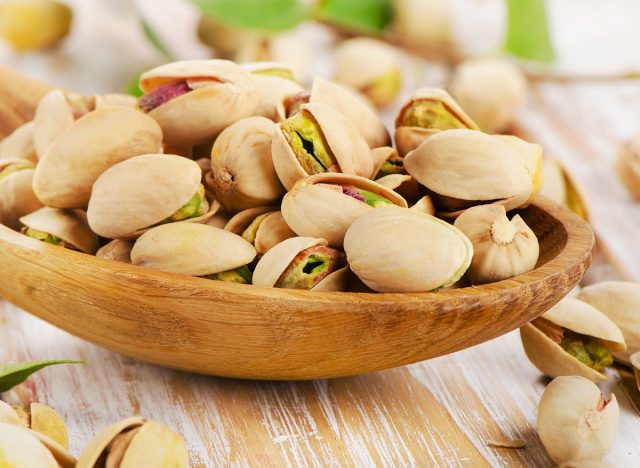
Another complete protein, pistachios are one of the snack nuts highest in protein content and "contain about 6 grams of complete plant-based protein per serving," says Goodson.
They're also a good source of fiber and unsaturated fat. All three nutrients combine to make pistachios a powerful appetite suppressant that can keep you from overeating. Not only that, but pistachios contain a large amount of potassium, packing in even more than a whole banana in just two ounces. In one study published in Nutrition, those who ate pistachios were found to have more waist circumference reduction than those who didn't eat pistachios.
And, there you have it. We hope out of these eight healthy, nutrient-dense, high-quality proteins, that you can find at least a few that you want to add into your daily routine.
A previous version of this story was published on June 27, 2022. It has been updated to include additional copy and proofreading revisions, additional research, and updated contextual links.


